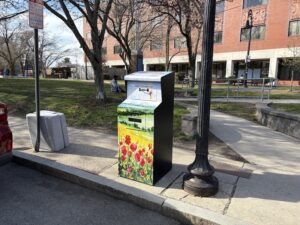Who is a member?
Our members are the local governments of Massachusetts and their elected and appointed leadership.
Mass Innovations, From The Beacon, May 2025

A new kiosk installed in a Somerville park allows people to deposit containers of needles as well as sharps and individual items.
In one of its most central parks, the city of Somerville has installed an outdoor dual-sharps kiosk that accepts individual needles and other “sharps,” as well as containers of them — a resource believed to be the first of its kind in the country.
In late March, the city placed the kiosk — with a cheerful, floral design — in an accessible outdoor setting in Seven Hills Park, near the Davis station on the MBTA’s Red Line. City officials hope the collection kiosk will reduce improperly discarded medical items in public places and better protect the public.
“This is one small but important piece of a complex and critical public health response,” Mayor Katjana Ballantyne said in a statement. “By expanding access to safe disposal, we’re helping protect both individual and community well-being.”
While the volume fluctuates throughout the year, the city gets six to 18 calls per month about improperly discarded sharps, such as needles, razors, syringes and lancets, according to Kelley Hiland, Somerville’s deputy public health director.
“So we used that data to really inform the need for this kiosk,” she said.
It is illegal in Massachusetts to toss sharps in household garbage. Until now, Somerville residents had to deposit their sharps, sealed in a container, inside the police station, Hiland said, while the Somerville Homeless Coalition Engagement Center also offered dropoffs for its clients.
City officials worried that making people enter a building — particularly a law enforcement facility — deterred them from properly disposing of their needles and sharps, due to privacy concerns and stigma.
City officials said they chose the curbside park location because it was accessible by foot, bicycle, train and car, and because a review of police calls and 311 service requests, aided by GIS mapping, identified it as an area where sharps were more likely to be present.
Hiland consulted Chrysalis Environmental Services, a company she had partnered with in the past. After about two years of development, Somerville became the first municipality to test the Dual Zeedle kiosk as a pilot project. She said the kiosks cost about $3,000 each.
From a distance, the kiosk resembles a library book dropoff bin, but on closer inspection, it features explicit instructions for its use. The kiosk’s top chute accepts containers, while the bottom slot takes individual sharps.
Hiland said Somerville is using opioid settlement funds to pay for the kiosk, but it is meant to serve a range of residents, including diabetics, women administering fertility treatments, and pet owners, as well as people struggling with drug addiction.
“We have received a lot of positive feedback from residents who are really glad to see another accessible place to dispose of their sharps,” Hiland said.
The kiosk’s design and placement also reflect health and safety considerations, she said. The company tested it for various weather conditions, and the floral design is a wrap that prevents the surface from getting too hot. Mounted to the ground and locked, the kiosk has been located away from garbage bins, so the receptacles don’t get confused.
The city has hired an outside vendor to empty the kiosk monthly, and Somerville community health workers will regularly monitor it for signs of vandalism or misuse.
Hiland said Somerville plans to locate additional kiosks near its east and west branch libraries, possibly by early fall. Placement depends on another project — the upcoming installation of public health vending machines — which the city wants to locate nearby.
The health vending machines will dispense a number of free items, Hiland said, which could include sunscreen, bug spray, winter hats and gloves, sharps containers, doses of overdose-reversing naloxone, and drug test strips. Focus groups are helping to advise on various aspects of the rollout.
Somerville plans to launch a public education campaign around these outdoor services, and wants stakeholder feedback.
“We really want the folks who are going to be the end users to inform it from the beginning,” Hiland said, “And then also keep them engaged as we go through the pilot process for both of these items, to make sure that it’s reaching who we need it to reach, and that we are also ensuring that folks feel comfortable using these services free of stigma.”
For more information about Somerville’s kiosk, contact Kelley Hiland, deputy public health director, at [email protected].